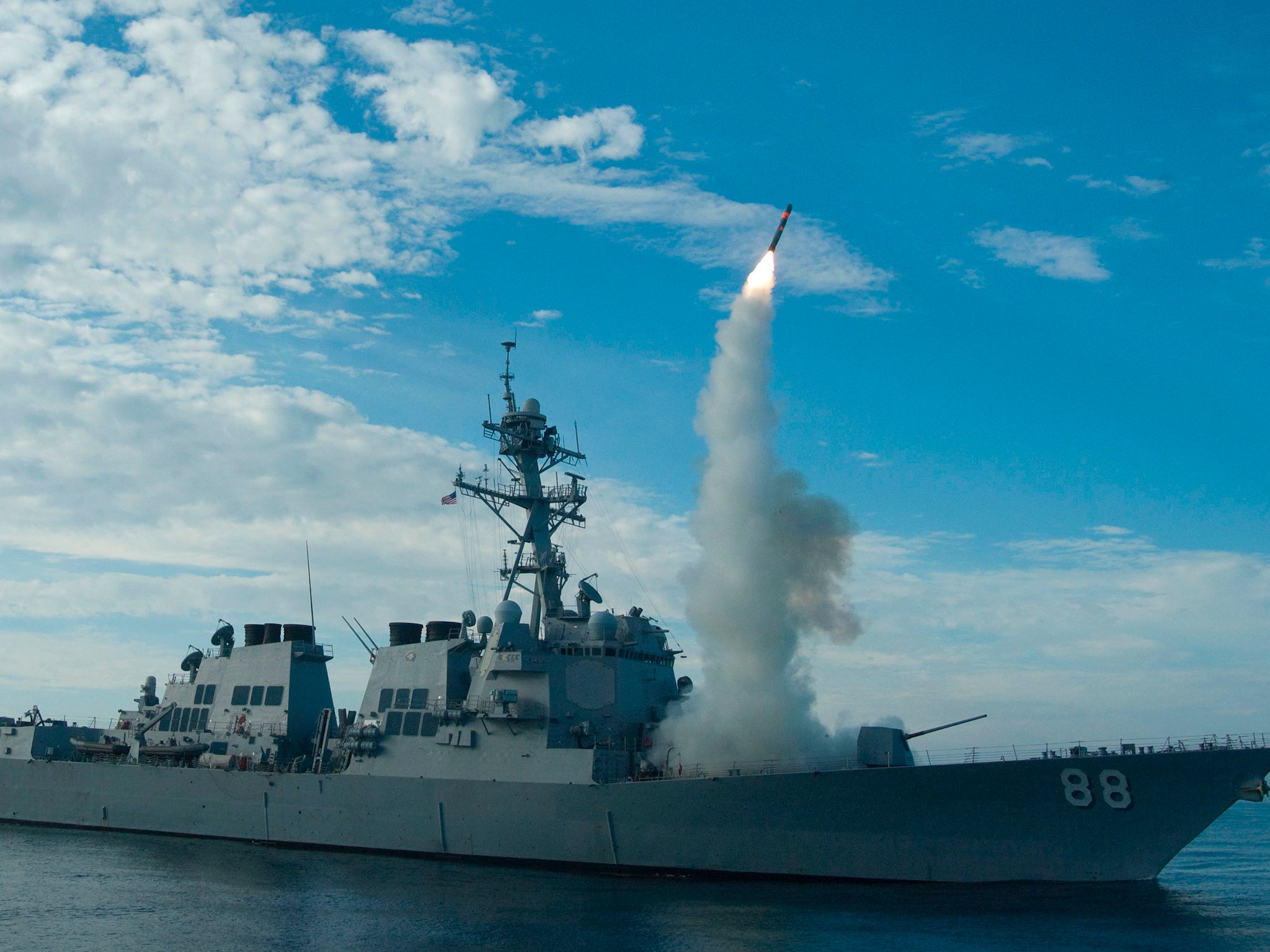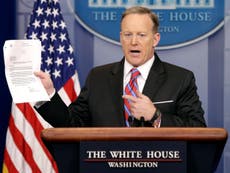Donald Trump's air attack on Syria may have been unlawful – but nobody seems to have noticed
International law is degraded when a breach of the UN charter is declared 'illegal but legitimate'. The rule of law requires a straightforward answer


Vladimir Putin and Jeremy Corbyn are among the few to show concern that the US's Tomahawk missile attack on a Syrian air base was “unlawful”. They are right, to the extent that the attack was a breach of the UN Charter Article 2(4), which prohibits the use of force against the territory of another member state.
The only explicit exception (contained in Article 51) is the right of self-defence. But not even the US – which stretched this concept to breaking point to excuse its invasion of Iraq in 2003 – could claim that Assad’s air force was likely to bomb Manhattan. Trump’s apologists claim his action was “unlawful but legitimate”. This oxymoron will not serve if Trump attacks Syria again, or starts bombing North Korea.
The notion of “legitimate lawbreaking” drove Jeremy Bentham mad: if you break the law, however good your motives, you must accept the punishment. This breach of international law, however, comes without any prospect that Trump will be arrested next time he plays golf in Scotland. He has not committed a war crime – he has not targeted schools or hospitals, a speciality of the Syrian air force, and he has not committed a crime against humanity because the lethal attack was not “widespread and systematic” – but if he carries out further attacks, the elements of this crime may coalesce.
What Trump would seem to have committed is the crime of aggression, as defined by the International Criminal Court in 2013; that covers the initiation, by a commander-in-chief, of actions such as a bombardment against the territory of another state which are “a manifest violation of the charter of the UN”.
There are, however, two problems with prosecuting. Only “an act of aggression which, by its character, gravity and scale” constitutes a charter violation. There is wriggle room here. The US could claim that the attack was small-scale and not “grave”, whatever that means (only six soldiers dead?). More importantly, the crime of aggression has not yet come into operation: although a bare minimum of state parties has ratified it, two thirds have yet to vote on the time it is to come into force. This is a dereliction of their duty; they should bring the crime of aggression into force as soon as possible, before President Trump commands more of it.
Some apologists claim that the charter breach may be justified under the “responsibility to protect” principle (known as R2P), which does have some legal salience. As originally formulated, it would have allowed unilateral intervention if a state was, for example, mass-murdering its own people and Security Council action was blocked by a superpower veto. But it was redefined – by the Security Council itself – and now exercises of R2P require, unsurprisingly, Security Council approval. So the principle does not apply to the US attack on Syria.
The only justification the White House can sensibly offer for its breach of the UN Charter is the right of humanitarian intervention. This does seem to be the President’s motivation (or at least his daughter’s), although there is one big problem with it: the US has always denied that this right exists in international law.
The UK accepts that it does, and its actions in Sierra Leone, Kosovo and the establishment of “safe havens” in Iraq are examples of armed intervention which served humanitarian ends. Indeed, England could claim the first articulation of the right.
Oliver Cromwell was moved to tears when his foreign secretary, the poet Milton, told of fellow Protestants “slain by the bloody Piedmontese that rolled/ Mother with infant down the rocks.” Cromwell announced a right to invade Piedmont (southern France) to stop “violation of the honest maxims of humane policy” because its Duke was persecuting Protestants. He quickly agreed to stop when Cromwell’s navy threatened Nice.
That principle would justify Nyrere’s invasion of Uganda and Israel’s attack on Entebbe in the dog days of Idi Amin, not to mention India’s invasion of Bangladesh to stop the Pakistani genocide. It seems absurd to speak of these actions as “unlawful but legitimate”. They are lawful because the charter, dedicated to the protection of peace and human rights, implicitly permits interventions that are intended to stop or to punish crimes against humanity.
That said, however, there must be preconditions to the exercise of the right – especially when the nation that previously denied its existence now declines to define it.
The first precondition is that commission of the crime by the targeted state should be objectively verified. The last US breach of the charter in this way, President Reagan’s bombing of Tripoli in 1986, was said to be justified by “pre-emptive self defence”, because an American soldier had been killed by a bomb at a Berlin disco and the CIA thought there was a Libyan terrorist conspiracy underway. In hindsight, the CIA appears to have been wrong, and the precipitate action should have awaited verification. I do not set any store by the Russian objection, which amounts to “Why would Assad use chemical weapons when he is winning the war? This smacks of the arguments you hear at the Old Bailey to explain away incriminating evidence – and the answer is that criminals are often stupid and, in Assad’s case, cruel as well.
Although Assad’s air force must be the prime suspect, there is a possible alternative explanation. The Chemical Weapons Convention, which Trump proclaims his action was designed to support, actually has a “challenge inspection” procedure whereby the US could have asked the Director General to undertake an urgent “anytime, anywhere” inspection and to confirm the culprit. That, at least, should have been done before the Tomahawks were released.
There are other preconditions, too, including that any armed attack must be a last resort. The Security Council may be pole-axed, but last December the General Assembly stepped up to the plate and launched an inquiry into Assad’s crimes which could lead to a prosecution and trial, probably in absentia.
Trump seems to have overlooked all the hopes of peace in Syria that were built on his own pro-Russian positions and on the Moscow meetings this week with his Secretary of State. The prospect that they might have led to an agreement to constrain Assad is now very distant.
The right of humanitarian intervention is a slippery slope. It must be carefully defined, and any government which claims it as a reason for breaching the UN charter must be able both to articulate the right and to explain how the preconditions for its exercise have been satisfied.
In the case of the Syrian attack, the White House has not been forthcoming. The UK has said the right could be invoked by the humanitarian need “to alleviate the scale of the overwhelming humanitarian catastrophe in Syria”, although it is unclear how this would be achieved by a single raid that has left the air base operational and that has, indirectly, encouraged Isis.
International law is degraded when a breach of the UN charter is declared “illegal but legitimate”. The rule of law requires a straightforward answer: it must be legal, and so it must fall within the strict limits of the humanitarian intervention right.
Member states of the ICC must hasten to bring into operation the crime of aggression, before Donald Trump – not to mention other states which may decide to imitate him – commit further breaches of the UN Charter.
Geoffrey Robertson QC is co-head of Doughty Street Chambers and author of ‘Crimes Against Humanity: The Struggle for Global Justice’



Join our commenting forum
Join thought-provoking conversations, follow other Independent readers and see their replies